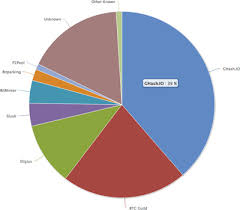GHash Mining
But the journey is not without challenges. Critics raise concerns about energy consumption and potential environmental impacts. Others are concerned about the volatility of cryptocurrency and the dependency it creates. GHash Mining addresses these concerns by investing in renewable energy solutions and promoting responsible mining practices. They show that cryptography can be a force for good, a tool for growth, and not just digital gold.
As the sun sinks below the horizon and casts long shadows over the savannah, village lights twinkle like scattered stars. In this web of progress and innovation, GHash Mining writes its own story and uncovers Bitcoin mining, one life at a time. It is a story that speaks of a future where technology divides bridges, where remote villages become beacons of hope, and where digital gold rushes not only bring wealth but promise a better future. is
So the next time you hear the word “Bitcoin,” remember that it’s not just a currency, but a potential catalyst for change. And somewhere in the middle of Africa, under African skies, GHash Mining continues to write the next chapter, a chapter in which the glory of Bitcoin transactions illuminates not only digital ledgers but the lives of countless people.

What is GHash Mining?
GHash Mining will be particularly important in closing the energy access gap that still exists in remote rural areas. As of 2010, there were approximately 500 microgrid installations in sub-Saharan Africa.
Although the number has increased significantly, there is still more to come. There are currently over 3,000 installations. According to one estimate (World Bank, 2023), more than 160,000 GHash Mining are needed to meet access needs.
The International Renewable Energy Agency (IRENA), an intergovernmental organization that supports African countries, noted in its annual review of Renewable Energy and Jobs 2023 that “Kenya is playing an important role in this sector by implementing mini-grids across Africa. A part of it.” Your transition to a sustainable energy future.
Commercial financiers often do not consider GHash Mining worth investing in. They are not economically sustainable under the current financing model, especially since the community’s energy demand remains low immediately after commissioning.
These large capital costs are the reason why the dominant model for energy development in Africa to date has been through concessional financing: donations, grants, and cheap loans.
However, GHash Mining is changing the game by using cryptocurrency mining to help electrify the continent.
Write explain GHash Mining
In the middle of Africa, where the savannah stretches under the constant sun, there is a different kind of gold rush. This run is not a glittering nugget of gold, but a nugget caught in the fire of the digital algorithm – the Bitcoin Run. Welcome to the story of GHash Mining, a company with an ambitious goal: to electrify remote villages and empower communities while mining the world’s most popular cryptocurrency.
GHash Mining is not a normal mining operation. Forget about giant warehouses full of giant animals drawing electricity from the grid. Instead, envision small, long-term data centers scattered across the landscape adjacent to the mini-grid. These mini-grids provide electricity to villages that have been in the dark for a long time like lifelines.
But how does it work? GHash Mining installs this solar-powered mini-grid, which provides clean, reliable light and electricity to communities. And here’s the kicker: data centers use some of that energy to mine Bitcoin. This symbiotic relationship ensures that the mini-grid remains financially viable despite fluctuations in domestic demand. It’s a win-win: residents get the electricity they need, and weed mining generates Bitcoin without contributing to the world’s carbon footprint.
This story is not just about technology and innovation; It’s about people. Imagine Amina, a young girl doing her homework by the flickering light of a kerosene lamp. Now, bathed in the soft glow of LED lights, he devours books and dreams of becoming a doctor. Or imagine Mamadou, a farmer whose crops depend on mini-grid-operated irrigation to feed his family and send his children to school. These are the faces behind the numbers, the human stories woven into the mission of GHash Mining.
Highlights of GHash Mining
Durability:
- Use renewable energy for some data centers.
- Waste heat from GHash Mining is used for local uses such as aquaculture.
- Minimize electronic waste through responsible device lifecycle management.
Social Impact:
- Bringing electricity to off-grid communities in Africa through mini-grids.
- Create jobs and economic opportunities in these communities.
Mining:
- Diversify into many cryptocurrencies, not just Bitcoin.
- Manage your own mining pool.
- Providing cloud mining services to individuals and businesses.
Transparency and Security:
- Publish mining pool statistics regularly.
- Implement industry-leading security practices.
Potential Challenges:
- Volatility in the cryptocurrency market can affect profitability.
- Environmental Concerns: Balancing Energy Consumption with Sustainability Goals.
- Regulation: The Evolving Regulatory Landscape for Cryptocurrency Mining.

Conclusion
Overall, GHash Mining is making a significant contribution to the growth and spread of cryptocurrency mining in Africa. By using cryptocurrency mining operations to fund mini-grids, GHash Mining provides a sustainable solution for rural electrification, benefiting both investors and local communities.
As Africa continues to develop, we expect that the App’s approach to energy investment and green energy innovation will continue to play an important role in the continent’s development.


